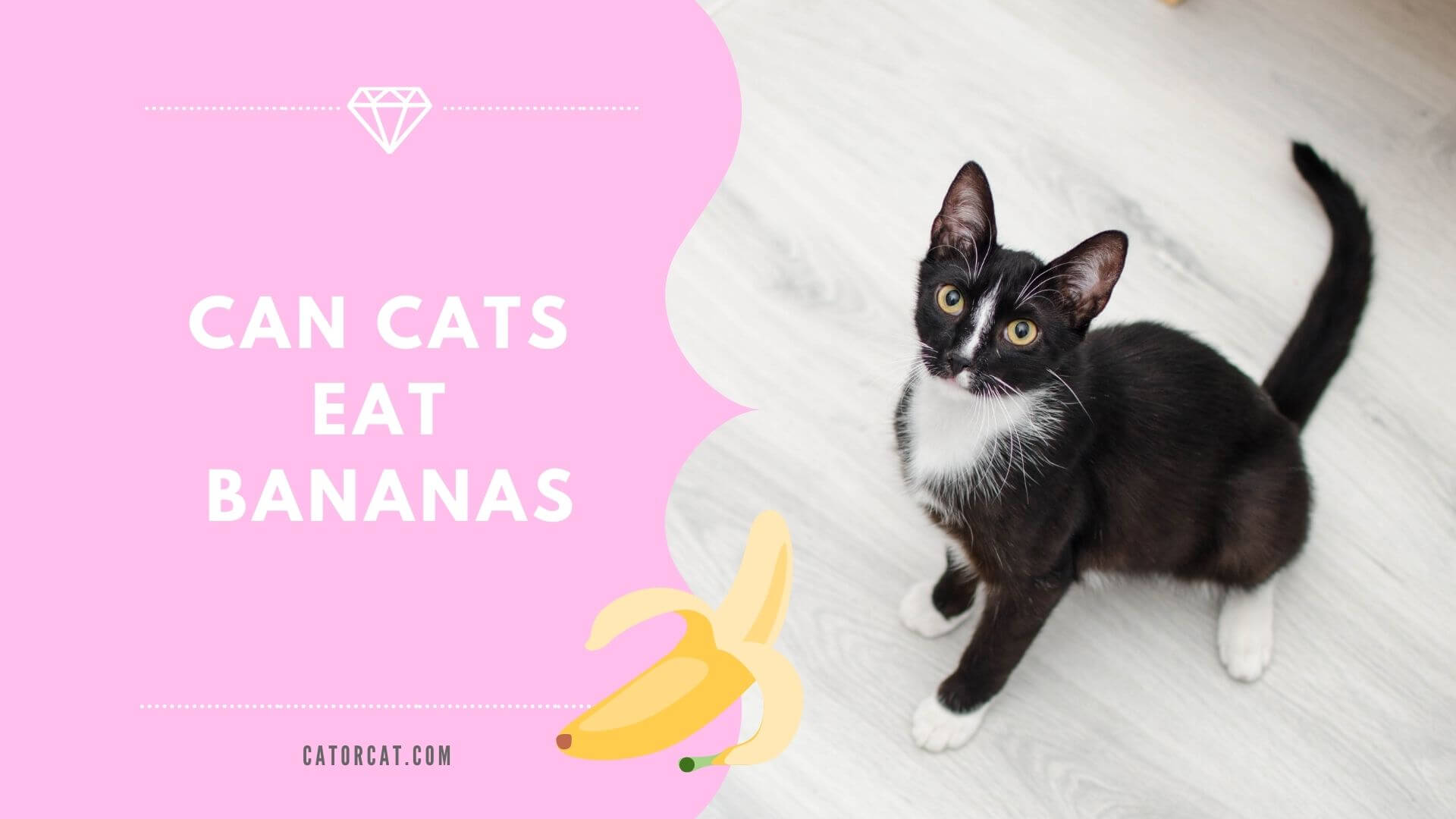
Bananas are nutritious and tasty and it would be a shame if our cats don’t get a taste of it. But hold on, should you feed your cat bananas?
When you’re eating a banana and your cat’s adorable eyes are begging you for a nibble, should you give in?
Bananas are packed with potassium, magnesium, fiber, and vitamin C. They’re great for us humans but how about cats?
Well, the answer is a little complicated. Let’s dig in.
Can Cats Eat Bananas?
Yes, cats can eat bananas because they’re not toxic for them. ASPCA, short for the American Society for the Prevention of Cruelty to Animals, labels bananas as non-toxic for felines, but the question is, should they eat bananas?
The answer is a sad no. Cats should not eat bananas because nutritionally, it does nothing for their health. And it can even cause digestive issues and spike up their blood sugar levels.
Cats are obligate carnivores and can only get nutrition from the protein in meats. Their digestive system lacks the necessary enzymes to break down plant-based food, which means if they eat bananas, it could lead to digestive issues such as diarrhea, bloating, or constipation.
Recommended – Safe food for cats:
Why You Shouldn’t Feed Banana to Your Cat
While a small nibble every now and then won’t be harmful to your cat, excessive consumption can be dangerous.
This is because bananas are full of sugar. Sugar can lead to unnecessary weight gain and could contribute to your cat’s obesity. As you know, obesity can lead to a number of health problems in felines, such as diabetes and other weight problems.
Cats also don’t have the sweet taste receptor, so they don’t experience the sweet taste of bananas. Our feline friends also cannot digest sugar in their stomach, which could lead to the build up of sugar in their digestive system.
And because bananas are heavy on the carbohydrates, it could make your cat feel full and not have the appetite to eat the food that actually provides her with the nutrition that she needs. A cat’s carbohydrate intake should not exceed 0-2% of her daily diet. Otherwise, consumption of carbs becomes harmful.
Why Are Cats Afraid of Bananas?
You might have seen a number of cat videos where cats jump at the sight of a banana. Cats are not exactly afraid of bananas but their aversion might be caused by the smell of the banana peel.
A banana peel emits an ethyl acetate smell which cats hate, so this could explain why cats seem to walk away from the sight of a banana.
Cats also seem to have a distaste for bananas because they simply don’t find it appealing. Cats have taste receptors for sour, bitter, salty, and umami flavors, but not sugars. If you feed her sugary fruits or candy, they’re more likely to walk away or if they do get a taste, it’s more likely caused by curiosity among other things.
Health Effects of Bananas for Cats
Though bananas are high in fiber, magnesium, Vitamin C, and potassium, they do nothing for cats. So feeding her banana thinking that it’s nutritious is actually futile.
Related: Best Supplements & Vitamins for Cats
Excessive consumption of bananas in cats can even increase her risk for diabetes and irritable bowel disease.
And though cases are rare, banana allergy does exist. To know if your cat is allergic to bananas, give her a bite size nibble and observe the effects. If she starts to itch, have difficult breathing, has facial welling, or vomiting profusely, your cat may be allergic to the fruit and must be taken to the vet immediately.
But My Cat Loves Bananas!
Not all cats will have an aversion to bananas. Because cats are interesting eaters, there may be some felines who will love to eat bananas.
Since bananas are not toxic for cats (what are toxic foods for cats), you can feed her a small nibble here and there but never make it a staple in her diet. Do not feed bananas everyday and only give her small amounts, such as a slice or two. Cats need a balanced diet but it doesn’t mean you have to feed her fruits and vegetables along with meat. Cats can get their complete nutrients from commercial cat food.
If you must give bananas as cat treats, remove the banana peel and make sure you cut the banana into bite-sized pieces.
Conclusion
Bananas are nutritious for humans but they’re not healthy for cats. They might be tasty for us, but cats, having no receptors for sweet taste, don’t find them appealing.
As obligate carnivores, cats get their primary nutrition from protein in meats. And although bananas are not toxic for cats, it is not advisable to feed them the fruit because it’s high in sugar and carbohydrates that do more harm than good for your feline friends.
Related:
